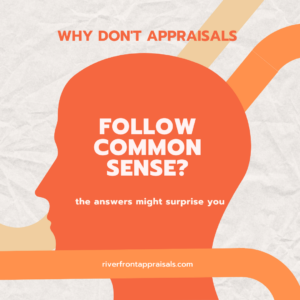
Property Taxes Just Went Up? We’ve Got You Covered!
It’s reassessment season for most folks in our area. Homeowners

In our introduction to this blog series, we explained the basics of USPAP, and what it means to promote and maintain public trust. In case you missed it, you can go back and read it here.
Hypothetical Conditions and Extraordinary Assumptions. All of this sounds like a bunch of weird appraisal-ese. Language no one else would ever use, or ever care to know about. So why write about it? Well, in fact, many appraisals use this language, and you need to know what it means!
We won’t get too deep with either of these, so don’t worry! We’ll define both terms briefly, and give a couple of examples of each. When you’re done with this blog post, you’ll know exactly what these terms mean the next time you come across them in an appraisal report.
So let’s start with hypothetical conditions.
What is a hypothetical condition?
Hypothetical conditions are conditions that the appraiser knows to be contrary to fact but takes them to be true for the purpose of the analysis.
In plain English? A hypothetical condition is not true. But for certain reasons explained in the report, the appraiser states it is true. Sound confusing? It can be! Let’s look at an example together.
One of the most common hypothetical conditions is in the case of a proposed property. This could be new construction from the ground up, or maybe a remodel subject-to completion. Appraisals for these purposes are based on a hypothetical condition—that is, that the improvements are already complete (home built/remodeled /etc) when, in fact, the improvements don’t even exist or remodeling hasn’t begun.
So what should you be on the lookout for? The appraiser must always clearly state that their value is based on the hypothetical condition. The condition must be explained, and the appraiser must state that use of the condition may affect assignment results (more on that later).
So the most common instance where hypothetical conditions are used is in proposed construction. What about another example?
A couple of years ago, I appraised a home with a family room converted from an attached garage, and the work wasn’t legally permitted. The lender wanted me to value the property as if the home didn’t have the family room, but had the original garage. So in this case, the garage didn’t exist. But I appraised it as if it did! Are you following?! It does get confusing sometimes! In this case, I made my appraisal subject-to the family room being converted back to the garage. I simply stated the hypothetical condition – that the home “had” no family room but did have a garage, and that use of the condition might have affected the assignment results. Again, this is a hypothetical condition, because what I said to be ‘true’ was in fact at the time of appraisal, not true.
What is an extraordinary assumption?
USPAP defines an extraordinary assumption as “an assignment-specific assumption as of the effective date regarding uncertain information used in analysis which, if found to be false, could alter the appraiser’s opinion or conclusions.”
Contrary to the hypothetical condition – which is something that does not exist, an extraordinary assumption may or may not exist. The most common instance of these assumptions are when an appraiser just isn’t sure about something, due to lack of access.
I’ve written about drive-by appraisals before. When we complete a drive-by appraisal, we usually only inspect the property from the exterior, and most of the time, it’s just from the street. And, since we’re not going inside the home, we consult various sources in order to give the client the best information possible. Those sources may include previous MLS listings, tax assessment records, Zillow, and the homeowner.
Now, no matter where we get our information, nothing can replace the appraiser actually completing an on-site inspection. So whatever alternate information we receive, it always has the possibility of containing error. Therefore, we base our valuation on the extraordinary assumption that the information we received is actually factual.
Another example is if we cannot gain access to an area. A few years ago, I was going through a home, when the homeowner said I ‘couldn’t go in that bedroom’. I don’t know the reason, but he refused me entry. On other occasions, I’ve been unable to get into a storage building or barn that was locked. Anytime access is not made, we may have questions about the condition, quality, or size of the area.
How do these affect my appraisal?
In either case – whether a hypothetical condition or an extraordinary assumption, the appraiser must mention that use of the condition of assumption may affect the assignment results. Why?
When completing an appraisal for proposed construction (subject-to completion), and using the hypothetical condition that the home is built per plans & specs, everything we state to be ‘true’ will affect value. So if we say the home is a three-bedroom, two-bath 2,000 square foot home, our value will be contingent on that home actually being built. Our comps will be similar to that home. Therefore, this condition affects the assignment results (value). If the homeowner decides instead to build a two-bedroom, one-bath 1,500 square foot home, then we’re gonna have a problem!
For the drive-by example above (extraordinary assumption), I’m looking at MLS records, tax records, and everything else I can get my hands on. And, I’m interviewing the homeowner (if I can). None of that information (usually) was collected physically myself. I didn’t measure the home. I didn’t go inside and see all the remodeling work the owner said he did last year. So I’m going to assume he’s telling the truth. I’m assuming that the tax records showing the home to be 2,300 square feet are accurate. And my value is going to be – at least in part – based on all of this information. So, if any of the information I collect and report is not true, then my value could be affected.
While some of these terms are sometimes confusing, they’re a part of a vast majority of appraisals we complete. As a homeowner, it’s important to know what these terms mean, and how they could affect your home’s value.
[bctt tweet=”While some of these terms are sometimes confusing, they’re a part of a vast majority of appraisals we complete. As a homeowner, it’s important to know what these terms mean, and how they could affect your home’s value.” username=”RiverfrontApp”]
If you have any questions about the appraisal process, or about our standards of professional practice (USPAP), please let us know. We’d be more than happy to help!
Helping homeowners navigate the appraisal process,
Ryan Bays, SRA, AI-RRS

It’s reassessment season for most folks in our area. Homeowners

I feel like we all need a laugh. How about

So this may be a slight break from the norm,
Riverfront Appraisals has been providing comprehensive valuations of residential properties to Western Kentucky and Southwestern Indiana since 2008.